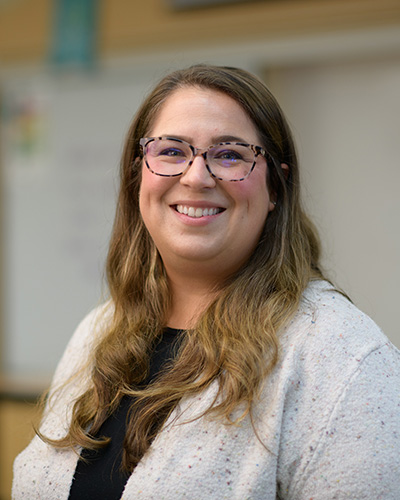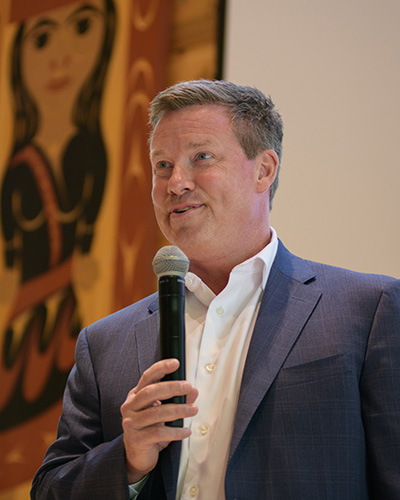Since 1981, the University of Washington has partnered with high schools across Washington state to offer official UW courses to interested students. But until now, the option to enroll and receive college credits came at a financial cost to many students and their families. This year, the passage of Senate Bill 5048 opened the door to higher education for thousands of high school students in Washington State. It’s an opportunity that UW in the High School (UWHS) director Tim Stetter and teachers like Karly McKee Weishaar have been waiting to see come to fruition.
UWHS lets ambitious high school students take University of Washington courses in their own classroom, with their own teachers who are trained and mentored by UW faculty. The high school teachers use UW syllabi and teach the course using the same texts, assessments and grading as instructors teaching on the UW campus. As a result, students can challenge themselves scholastically by experiencing the rigors of a UW course. Historically, 92% of students in the UWHS program pass their courses — and they have the chance to earn UW credit they can transfer to most colleges and universities nationwide.

UWHS teacher Karly McKee Weishaar.
In the past, however, there was a drawback. Students who wanted to earn college credit in UWHS and other College in the High School courses in Washington state have had to pay as much as $375 to register to earn college credit for a 5-credit course. While some school districts were able to find limited state grants or other funds to subsidize students, many other students and families had to find a way to pay for the credits themselves. This fee-based model perpetuated inequity in access to education.
Karly McKee Weishaar, a biology teacher who’s taught the UW Biology 100 course Introductory Biology: Addiction and the Brain for the past six years at Spanaway Lake High School, has experienced this phenomenon firsthand. “I teach at a high school where there's a lot of low-income families and where money can be tight,” she says. “I teach two periods of my course, ranging from 20 to 30 students. In this past year, only two out of 40 students took the class for credit because of the cost of the class.”
Over the last year, a group of education leaders and a key legislator came together to change that.
A Path Forward
In the summer of 2022, Senator Mark Mullet of Issaquah released a draft framework for Senate Bill 5048, which called for the state to eliminate College in the High School fees for all public school students. UW Continuum College staff had provided data and insights that informed that framework and enthusiastically joined a team of advocates who helped engage with the Washington State Legislature for the next six months to encourage the bill’s passage.
In past years, the state legislature had considered different funding models for College in the High School programs, but none had gained traction until now. “As one senator, I don't have the chance to talk to all 147 elected officials in Olympia, but with UW’s support, we were able to talk to all of them,” Mullet says. “It's helpful when you have more people on the ground, having those conversations with each elected official. That made a huge difference this session.”

Senator Mark Mullet speaks at UWHS event.
The bill passed the Senate and House unanimously during the most recent legislative session, and Governor Jay Inslee signed the bill into law on May 4, 2023. That means beginning with the 2023-2024 school year, thousands of academically eligible public high school students across the state can take courses from UW – and earn UW credit – at no cost.
In 2022-23, more than 5,000 students earned UW credit in UW courses at more than 100 high schools across Washington. Stetter anticipates this will increase to 7,500 students in 2023-24, a 50% increase, which represents all the students who could not afford to pay the fee to register. These numbers will increase again in 2024-25 from an expanded roster of schools adding UW courses.
“This legislation is a game changer,” says Stetter, who has been leading the UWHS program in partnership with UW Continuum College since 2009. “To give academically eligible public school students access to free college courses, with no credit limits, opens the door to higher learning for everyone.”
Mullet agrees, adding he hopes this new legislation will provide Washington students with increased access for years to come. “There are too many kids who can succeed in these classes that aren’t getting college credit because they can’t afford to pay the fee,” he says.
Opening the Door to Opportunity
When classes started at public high schools this fall, students didn’t see a dollar sign on their UWHS registration form for the first time, a surprise that McKee Weishaar was excited to share with her students.
UWHS provides an opportunity for students that would be the first in their family to go to college to get a feel for classes and become more interested in expanding or continuing their post-high school education.
— Karly McKee Weishaar, UWHS biology teacher, Spanaway Lake High School
The first question my students ask about UWHS is, ‘How much does it cost?’ Being able to tell them there’s no cost, they just have to work hard, learn the material, demonstrate their knowledge and they'll earn those credits for free, is amazing,” she says. “I imagine I'll have many more students registering for the credit. And I think that's going to push them to work harder. If they end up with a transcript and college credit, it makes it feel more advanced than taking a high school science class.”
The new legislation also opens the door to higher education for students who might not have otherwise considered college as an option. “We have a ton of students that come through our school that would be the first in their family to go to college,” McKee Weishaar says. “UWHS provides an opportunity for them to get a feel for college classes and become more interested in expanding or continuing their post-high school education.”
Even better, the new state funding is creating more opportunities for public schools. “The funding opens up access, but not just for students; it helps schools look more carefully at their offerings,” says Janet Blanford, the director of secondary success, college & career readiness for Highline Public Schools. “Now, the schools know if they decide to offer these courses there’s assurance that there will be funding to support this initiative and for their students to get credit.”
The passage of this legislation will encourage more high schools and school districts — particularly those with higher percentages of low-income students — to deepen their relationships with UWHS and broaden the number of UW courses they offer for the 2024-2025 school year. “Currently, we only have one UWHS class,” says McKee Weishaar. “But offering more classes for kids to earn more credit would be fantastic.”
